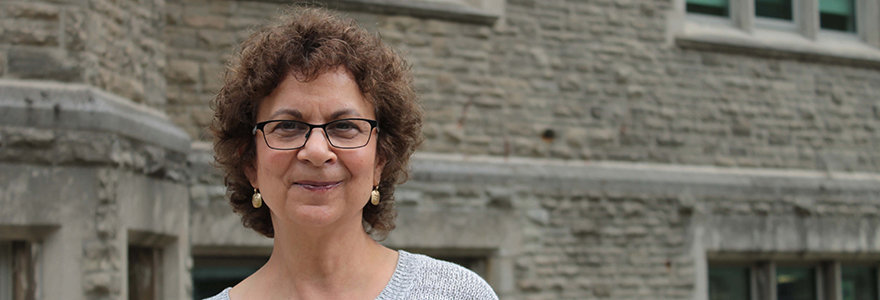
Dr. Lynne Zarbatany
Professor Emeritus - Social, Personality and Developmental Psychology
Email: lynnez@uwo.ca
-
Publications
-
Research
Selected Publications
Zarbatany, L., Tremblay, P. F., Ellis, W. E., Chen, X., Kinal, M., & Boyko, L. (in press). Peer clique participation of victimized children: Characteristics and implications for victimization over a school year. Merrill-Palmer Quarterly.
Ellis, W., & Zarbatany, L. (in press). Understanding processes of peer clique influence in late childhood and early adolescence. Child Development Perspectives.
Chen, X., Liu, J., Ellis, W. E., & Zarbatany, L. (2016). Social sensitivity and adjustment in Chinese and Canadian children. Child Development, 87, 1115-1129.
Zhao, S., Chen, X., Ellis, W., & Zarbatany, L. (2016). Affiliation with socially withdrawn groups and children’s social and psychological adjustment. Journal of Abnormal Child Psychology, 44, 1279-1290.
Zarbatany, L., & Marshall, K. (2015). Are first impressions of unknown children and early adolescents affected by the facial attractiveness of their best friend? Merrill-Palmer Quarterly, 61, 468-485.
Liu, J., Chen, X., Coplan, R., Ding, X., Zarbatany, L., & Ellis, W. E. (2015). Shyness and unsociability and their relations with adjustment in Chinese and Canadian children. Journal of Cross-Cultural Psychology, 46, 371–386.
Ellis, W. E., & Zarbatany, L. (2007). Explaining friendship formation and friendship stability:The role of children’s and friends’ aggression and victimization, Merrill-Palmer Quarterly, 53, 79-104.
Ellis, W.E., & Zarbatany, L. (2007). Peer group status as a moderator of group influence on children’s deviant, aggressive and prosocial behavior. Child Development, 78, 1240-1254.
Research
My research team consists of colleagues, graduate, and undergraduate students who are working on projects related to peer group influence in preadolescence and early adolescence. Our research employs a variety of methods including self report questionnaires, sociometrics, interviews, and observations, in experimental and non-experimental research designs. The vast majority of our research is conducted in schools in and around London, although we also have access to a child research participant pool consisting of over 2,000 children from birth through adolescence.
Some of our current research topics are as follows:
1. Our main research focus currently is on peer cliques, clusters of children ranging in size from 3 to 20 who regularly hang out together. There is good reason to believe that these cliques exert considerable influence on their members as children strive to adhere to clique norms to maintain their clique membership. In fact, we believe that peer cliques may account for the majority of peer group influence on behavior and psychological functioning. When clique behavioral norms reflect socially desirable values (e.g., academic achievement, prosocial behavior), the socializing effects of cliques on their members can be fantastic. When clique norms consist of antisocial values and behavior (e.g., aggression, delinquency), however, clique socialization effects are problematic. In a large short-term longitudinal study, we are assessing the impact of clique norms on various aspects of youths’ behavior and social and psychological adjustment over the period of an academic year. Our sample consists of just over 1,000 children in Grades 4 through 8 (i.e., ages 9-14 years).
2. Although not much assessed in previous research, cliques vary in the extent of their influence on their members, and members vary in the degree to which they influence and are influenced by other clique members. We are examining nuances of clique influence in reference to clique status within the larger peer network, and individual status within cliques. We anticipate that high-status cliques will exert more influence than low status cliques, and high status individuals will exert more influence than low status individuals within cliques. If we are correct, then broad conclusions about peer group influence will need to be fine-tuned. For example, although researchers have shown that membership in aggressive peer group leads to more aggressive behavior over time, we would suggest that being a low status member of a popular aggressive group poses the greatest risk for increases in aggressive behavior.
3. There is consensus among researchers of peer group relations that peer cliques play an important role in socializing children’s and adolescents’ behavior, but for the most part, the processes by which these socialization effects occur are unknown. Our research group has videotaped interactions of over 150 peer cliques and we are looking for characteristics of the clique members’ discourse and behaviour that may account for changes in their behaviour and/or psychological adjustment over a 6-month period. In other words, we are attempting one of the very first analyses of peer group socialization processes. Stay tuned for findings on this important topic!
Contact Information
I invite interested students to contact me by e-mail lynnez@uwo.ca, regular mail Department of Psychology, Westminster Hall, The University of Western Ontario, London, ON, Canada, N6A 3K7, or phone 519-661-3664.
